by Jere Dennison
It was one of those magnificent early spring days in Deltaville: a cloudless blue sky, a delicate blush of green on budding trees, daffodils abloom, and a ground mist clinging brightly to the still dank earth. But the crowd assembled around the little white church were anything but joyous. They had come to bury William Castle Boothe Roberts, revered Fishing Bay Yacht Club Manager for over 30 years.
In the days before the funeral, Club Executive Secretary, Fannie Taylor, had feverishly telephoned every Past Commodore, every Flag Officer, Board and Committee Member, and other Club members who had had enjoyed a close association with Mr. Roberts. You are expected to be in attendance, she said, with blue blazer, khakis, white shirt, and tie. This was an order, not a request. But her prodding was unnecessary...we all knew we must be there.
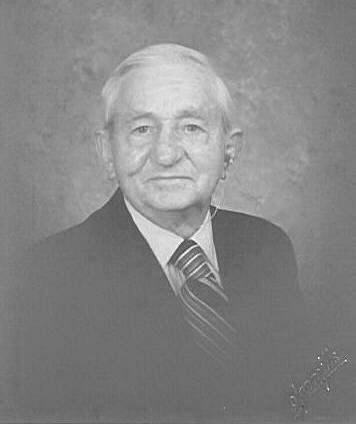 |
| Mr. Roberts |
A double line of blue-jacketed members spanned out around the path leading to the country graveyard while a flag-draped casket was moved to its final resting-place. After eulogies celebrating Mr. Roberts life, burial rites were administered. A Coast Guard Honor Guard, almost invisible against the backdrop of the adjacent stand of trees, fired a brisk rifle salute. After a brief interlude of absolute silence was broken by the mournful tune of Taps played out by a lone bugler in the woods, many found it difficult to choke back their emotions...
It was 1980. Mr. Roberts (his nickname was Bob but few of us ever addressed him in this manner) had held the position of Club Manager since our move from Urbanna to Deltaville in 1949. He was the constant face of the Club for so many years that few could imagine how we could survive without his guiding hand on the operations of the Club. But many of us are unaware of his background before he arrived in 1949 on his beloved tractor to offer assistance to members in building the concrete boat ramp. He stayed on as Club Manager and for several early years received no pay. How were we so fortunate to acquire his devotion and skills?
Born in 1904 on a farm in Amelia County, he was the youngest son of nine children. Seeking predictable employment after high school, he decided to enlist in the Coast Guard as the depression loomed. While stationed in Norfolk, he met his wife, Eleanor, at age 29. At the beginning of World War II, he attained the rank of Gunnery Officer and served on a submarine chaser off the coasts of Virginia and North Carolina. It was during this period that he lost most of his hearing, which left him permanently reliant on a hearing aid for the rest of his life. Mounting a turret on his ship to help dislodge live ammunition that had misfired in a large caliber gun, the shell exploded as he approached. He experienced a concussion and lost 100% of his hearing in one ear. Over the next few years, his hearing in the other ear gradually deteriorated, eventually rendering him 90% deaf. By the late 1940s, the Coast Guard was ready to grant him early retirement for his disability.
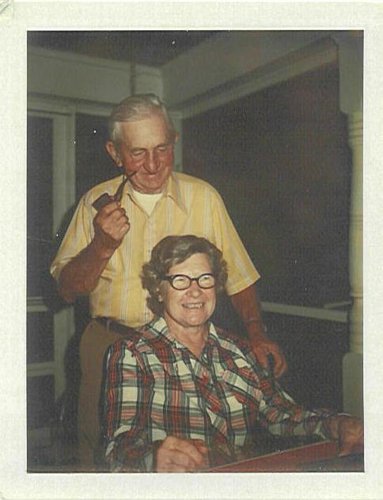 |
| Mr. Roberts and Eleanor |
While stationed in Norfolk, Mr. Roberts had often traveled on fishing trips to the Deltaville area. Upon retirement, he persuaded Eleanor that Deltaville would make a terrific home to raise a family. They located a nice old house on Porpoise Creek, just off the Piankatank, but were advised against the purchase by locals who proclaimed that only poor people lived on the water. Evidently the more prosperous folk had abandoned the shoreline for landlocked property in the village of Deltaville. He wisely ignored their advice and moved to his new home on the river, which, as a bonus, came at a bargain price. But early life here was not without its hardships there was no electricity save for that generated by a household Delco generator operating for a few hours each evening; although the house enjoyed the luxury of indoor plumbing, a windmill pumped well water; telephone service was non-existent until several years had elapsed and a party-line installed.
After the move to Deltaville, he bought his tractor, the only tractor he ever owned. It was the tractor that introduced him to the yacht club and the tractor that allowed him to work on jobs for others in the vicinity as well. He cut grass, he hauled debris, he gave rides to children at the Club, and he sprayed DDT for mosquito control on Stove Point. You could always tell when he was at work spraying the Point would be enveloped by a white cloud of insecticide as his tractor lumbered up the road.
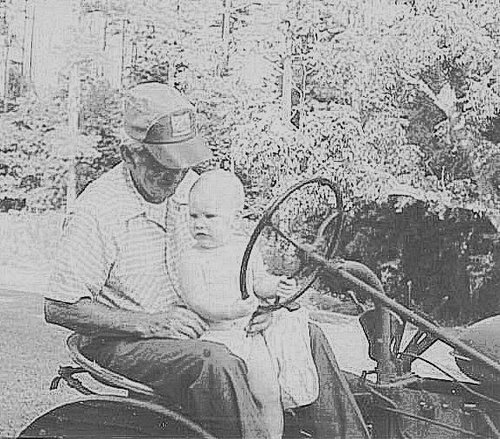 |
| Mr. Roberts on his tractor |
One story he liked to tell was about the Clubs neighbors, Beverly and Edith Hancock, who had also recently retired to the house just west of the Club, now owned by the Ralstons. They had summoned Mr. Roberts and his tractor to remove the corpse of a deer that had washed up on their beach. An ardent conservationist and recycler of organic materials, Edith asked him to please haul the deer up to her yard and place it upon the large compost heap created to fertilize her extensive gardens. After the project was completed, Beverly pulled Mr. Roberts aside and asked him to swear that he would not allow Edith to place him on the compost heap after his death.
Mr. Roberts was a hands-on Club Manager. He performed most of the painting, grass cutting, and other maintenance chores himself. It was not uncommon to see him painting the interior of the old clubhouse in the dead of winter when no members were around to supervise. And during the summer, he was omnipresent, tending to the launch, pier, and a myriad of facility problems. Plumbing was the bane of his existence, but he was the only one who understood the labyrinth of pipes and valves that coursed through the Clubs property. Often he served on the Race Committee and fired the shotgun signaling the beginning and end of races. That was his job, too, on opening day to signal the start of each new season.
One duty about which he was particularly diligent was flag etiquette. Besides raising the colors in the morning and lowering them each evening, he took great pains to survey the Club each day during the sailing season to determine the highest ranking flag officer present so that the proper commodores flag could be raised. This act was done with so little fanfare that most members were unaware of it happening.
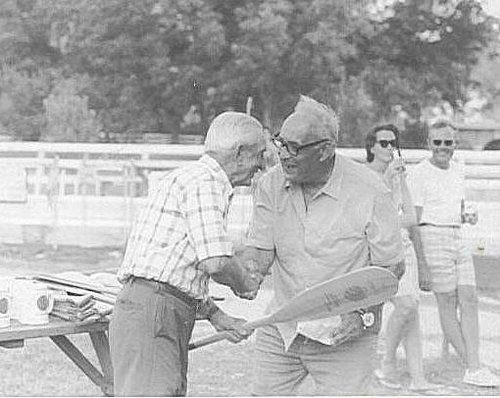 |
| Receiving RC momento from Ralph Lynn (right) after Jollyboat N.A.'s in 1970 |
Mr. Roberts was the grandfather in locus to just about every yacht club junior. He watched them like a hawk and often treated them to free sodas from the drink machine that he owned and operated at the Club. He continued to operate this concession throughout the years in spite of its many annoyances. Some of the kids would attempt to dislodge free drinks by inserting slugs and other items into the money slot. The first drink machine that he operated was one of those rectangular tubs holding sodas by the neck with the bottoms submerged in cold water. You would put your nickel in the slot and slide your bottle of choice to a gate that would open to allow only one drink to be removed. Some of the more cunning juniors discovered that you could open the lid, pop off the top of a soda with a church-key, and, leaning into the cooler, suck out the contents of the bottle with a straw. This irked Mr. Roberts to such an extent that he would sometimes hide in the loft of the mens room to surprise suspected kids in the commission of their crimes. Most culprits were usually punished with a gentle admonition and the dispensing of a free drink in return for a promise not to repeat the crime.
As the youngsters grew up, Mr. Roberts would take great delight in telling and retelling embarrassing stories of their youthful transgressions. Your author was periodically the target of some of these stories in spite of his vehement protestations that they had been embellished for the benefit of the audience at hand. Mr. Roberts never tired of spinning these tales, and his memory of the salient details was absolutely astounding. In spite of his deafness and an age that earned him fossil status amongst the juniors, nothing ever got past him.
Mr. Roberts had such an affection for the juniors in the Club that in 1962 a group of members presented a perpetual trophy in his name to be awarded annually to the member of the Junior Program who shows the most interest in sailing as evidenced by enthusiasm, improvement in sailing techniques, awareness of the rules of water safety, and cooperation with the members of the Junior Activities program. Mr. Roberts was always present to make the junior awards each summer, and his wife, Eleanor, distributed homemade cookies to all the participants.
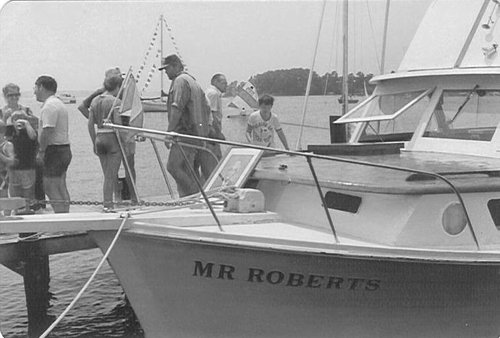 |
| Christening of the Mr. Roberts in 1980 |
So much had he earned the Clubs esteem that Mr. Roberts was awarded the Matthew Fontaine Maury Bowl in 1978 for his outstanding contribution to sailing. For a man who rarely set foot on a sailing vessel, this was truly a significant tribute. His stewardship during the formative years of FBYC was invaluable, and his positive influence on generations of FBYC sailors is truly immeasurable. But perhaps his memory will be most enduring through the christening of the Clubs committee boats with the name of Mr. Roberts. The first to bear his name was commissioned in 1980 shortly after his death. This boat was replaced in the early 1990s with the current vessel that bears the name of Mr. Roberts II.
One of his favorite expressions, that may still have application today, is that FBYC would always survive as long as God looks out after drunks and children. Amen.
Afterword: This story was prepared with the assistance of Tom Roberts, Mr. Roberts Son. In December 2002, Toms Mother, Eleanor Rue Warren Roberts, passed away at age 89 as a resident of Westminster-Canterbury in Richmond. Two sons, two daughters, six grandchildren, and five great-grandchildren survive Mr. Roberts and Eleanor. Eleanor rests next to her husband in the tranquil churchyard of the Clarksbury United Methodist Church on Rt.33, only a short tractor ride away from the Fishing Bay Yacht Club.